A fine repertoire of research in the making – reflections from the Spring School 2021
The whole event started with a pre-workshop on 15 April. Post-doctoral researcher Joanna Kedra and Senior University Lecturer Judit Hahn held a workshop on how to deliver successful online presentations, a topic well suited for this Spring School, held online for the first time. Joanna Kedra and Judit Hahn explored several thoughts that academics should consider and evoked fruitful discussion with workshop participants.
– My take from the workshop is that it is highly important to put yourself in your audience’s shoes when making a presentation, whether it is online or face-to-face, says Mai Shirahata.
– The expression of ‘presentation karaoke’ made me reflect upon the importance of interaction with my potential (unseen or hidden or multimodally existent) audience during my online presentation, Dukkeum Sun notes.
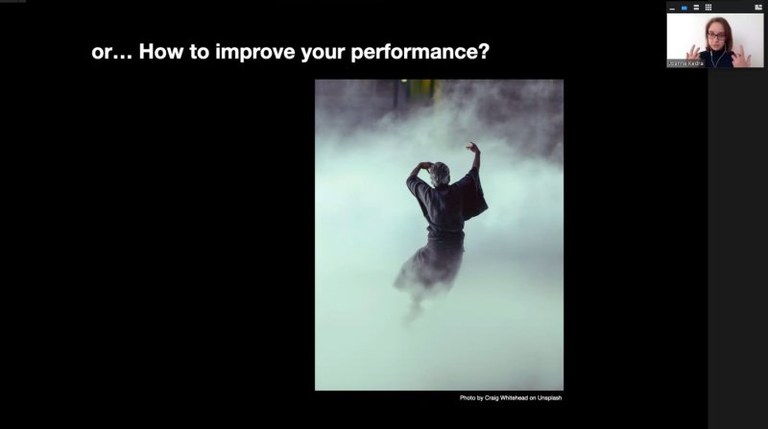
Image: Joanna Kedra sharing tips on what to focus on when planning your presentation.
From research ethics to 12 different topics
The main event on Thursday 22 April started with a keynote speech from Professor Srikant Sarangi from Aalborg University, Denmark. He talked about research ethics, focusing on the ethics of access. He touched upon many ethical, practical and legal issues that often come up during research projects.
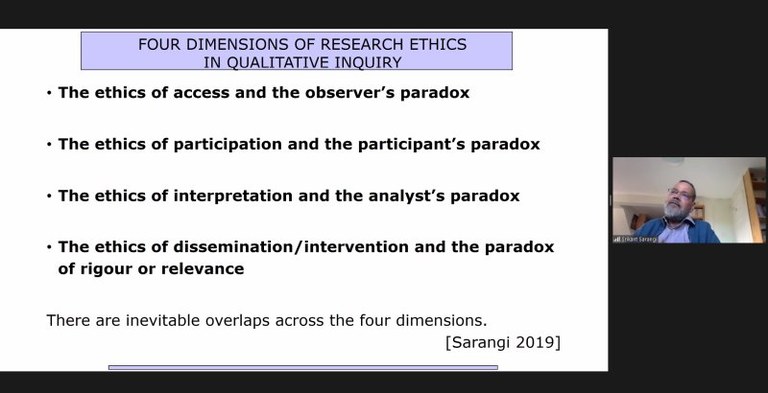
Image: Srikant Sarangi offering insights on research ethics during his keynote.
The keynote was followed by a fascinating panel discussion where Associate Professor Marko Siitonen, Senior Researcher Saara Jäntti and Doctoral Researcher Nina Sivunen debated on the topics raised during the keynote.
– The panel discussion made me aware of the diversity and complexity of ethical issues of linguistics and communication studies, Tanja Seppälä looks back on the discussion.
The most important part of the Spring School was naturally the presentations by doctoral researchers that took place on Thursday and Friday. This year, the event gathered 36 participants, of which 12 gave presentations on their ongoing research. Topics varied from language learning and training to societal debates and the role of technology in care work. The presenters received valuable feedback from more senior commentators, that gave their time to help develop the studies even further.
– I feel more than grateful and inspired by the energy and passion from the presenters who tried to edit their presentation materials until one night before the presentation day, the commentators who never hesitated to say yes for our invitation and to share not only great but also sincere comments and advice for presenters’ work, the audience who leaves great and encouraging feedback and comments in the chatting room. Everyone was quite professional at each role, Dukkeum Sun comments.
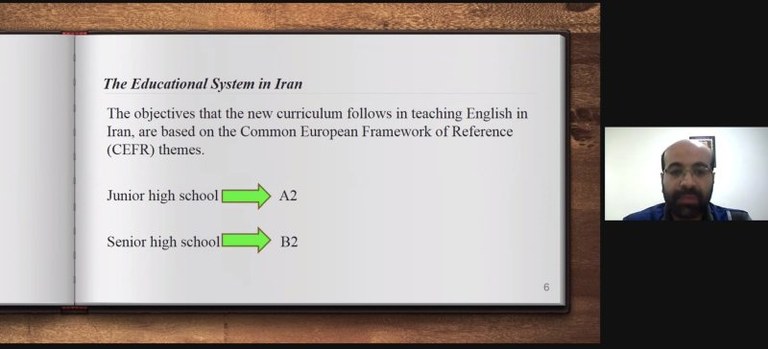
Image: Karim Rezagah introduces his research about teachers' assessment literacy in Iranian EFL school.
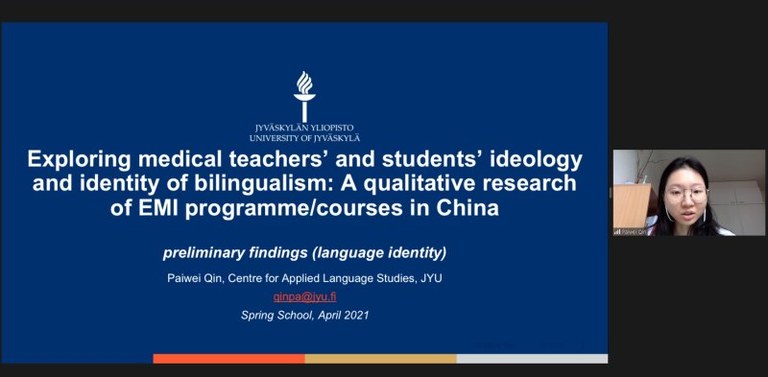
Image: Paiwei Qin presenting her research on exploring medical teachers' and students' language ideology.
– The online presentations went rather well since we had different options for discussions after each presentation. While commentators were giving the presenters comments verbally, audience members used the chat so that the conversations were rolling in both verbal and text format. Presenters could also read additional chat comments after their presentation. Hopefully, this helped them to get more feedback, Karina Doi says.
To make up for the lack of discussions on coffee breaks and other social events, that are sometimes the best part of on-site conferences, interactive online breaks were arranged.
– It was nice to chat with people and meet new and familiar faces during the coffee breaks. It can’t replace face-to face interaction but still creates a feeling of community, Polina Vorobeva comments.
Brought to you by doctoral researchers
The organizing team consisted of nine people, most of whom are doctoral researchers from the Department of Language and Communication Studies and the Centre for Applied Language Studies.
– I believe that a lot of doctoral researchers like me have felt a strong need of sense of community. Through this experience, I got to know that there ARE people who can share same kind of pleasure, sorrow, love and joy, doing same things. To me, this experience of organizing has connected myself, an individual researcher from a lonely planet, to people out there, Dukkeum Sun reflects on the event.
– To work with the amazing organizing team was a great pleasure! It’s a great opportunity to see behind the scenes of the event and participate in the organizing process, Polina Vorobeva summarizes.
Karina Doi emphasizes that she learned a lot by being an organizer:
– From doing all the organizing work online, recruiting the speakers, presenters and commentators within the limited timeframe, to how we went through all the processes using different platforms during the event. I’m so glad that I could work with really active and enthusiastic team members. I thank all the participants who said “yes!” to contribute to the events.
– It was a valuable experience for me to be part of this organizing team. I enjoyed working with people from different subject groups. Thank you all! Mai Shirahata adds.
As you can read from these comments, we enjoyed putting the event together. We hope to meet you next year at the Spring School 2022!
Organizing team of the Spring School 2021
Karina Doi
Minttu Laine
Kirsi Leskinen
Jari Parkkinen
Tanja Seppälä
Mai Shirahata
Dukkeum Sun
Pasi Ikonen
Polina Vorobeva
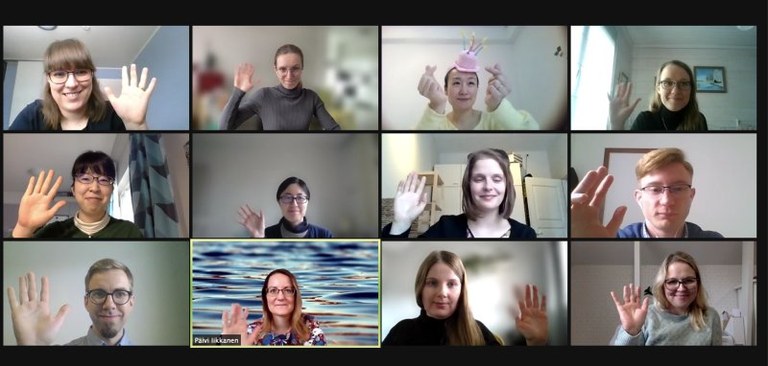
Image: Participants at the end of the Spring School on Friday 23 April.
